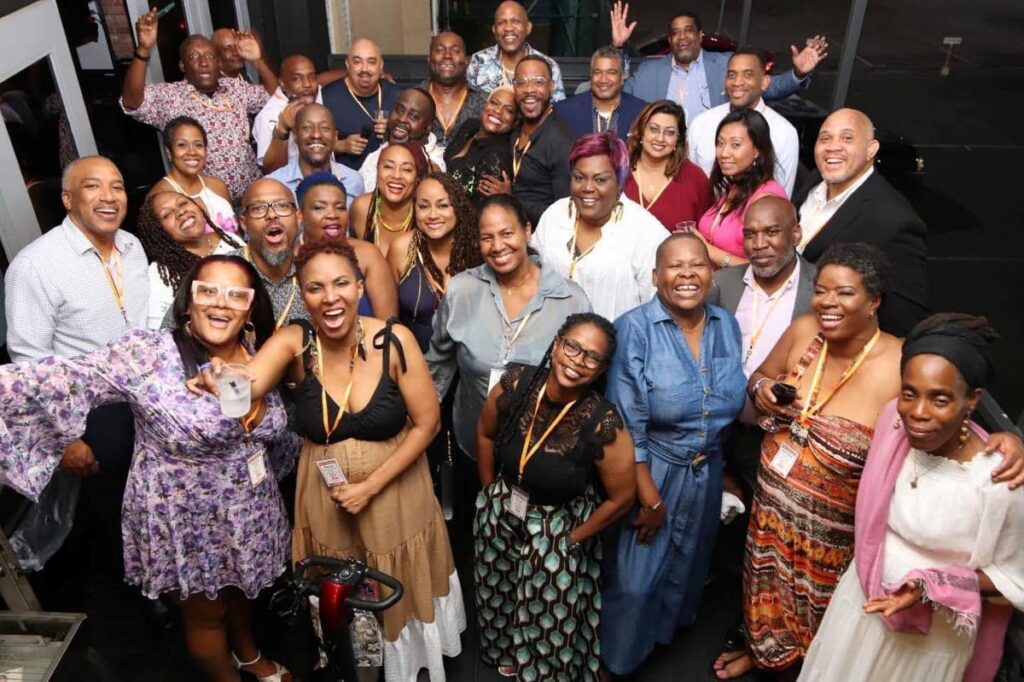Overcoming pink elephants, three-headed aliens

Stacey Samuel-OBrien
Trinidadians and Tobagonians are warm, inviting and fun-loving people.
We can also be brutal, blunt and honest to a fault. Take a moment to think of all the people you know with nicknames and think further about the origin of those nicknames, and you’ll get my point. I have an American ex who summed it up well when he said that my friends and I were very nice people; we just weren’t nice to each other.
I don’t think that we are mean-spirited, but it’s a good idea to develop a thick skin growing up in Trinidad, because at some point, you will be the butt of some ole talk and you need to be prepared for it.
I honestly feel that the main reason that I handle having multiple sclerosis (MS) so well is that I am Trinidadian. We have a knack for finding humour in the most serious situations, and so I find humour in situations that might make the average person cry.
That said, I still braced myself for reactions to my using the scooter at home, which, in true Trini style, could have ranged from gently clever to hilariously cruel.
The first time I visited with the scooter, my mother and I went to Trincity Mall. That day I may as well have been a three-headed alien because of how people were staring at me. They just stood and gawked, some even bending corners to continue looking.
Now, truth be told, it didn’t bother me in the least; in fact, I remember being amused by it all.
I didn’t think that people were being malicious, I think they were more curious than anything else. There I was, driving around on this scooter, doing my thing, and I was probably an anomaly because it’s just not the norm to see a disabled person doing so, far less one on a scooter. The only time I’ve seen a scooter in Trinidad is on the sales floor in a medical supply store; I’ve never actually seen anybody using one.
In fact, growing up, I cannot say that I’d ever seen a disabled person. I’m sure they existed, but they were just nowhere in my world. My friend from high school, Fabi, who is a paraplegic living in Trinidad, said the disabled population simply isn’t visible, and not necessarily by their own volition. Unfortunately, if a disabled person cannot move around freely, at minimum needing a ramp or a functional elevator, for example, or if we feel uncomfortable, we will inevitably “bat in we crease.”
As Fabi puts it, “We are the biggest fluorescent pink elephants in the room. We get stared at and ignored at exactly the same time in society.”
Admittedly, the staring only happened the first few times I was home. When I visited in May, we went to PriceSmart and I didn’t notice anyone paying attention to me. Fabi says things are changing as disabled people become more visible, on social media and being cast in movies and on TV.
In my opinion, based on my experiences in places I’ve visited while in Trinidad, there are some amenities and accommodations for the disabled, but we still have far to go to make the disabled community feel completely included.
I went to a party in May and the driver, asked one of the security guards if we could park as close to the entrance as possible because I am disabled. The guard opened up a spot to allow us to park without hesitation.
As I got out and my friends started taking out the scooter, an arbitrary partygoer stopped to offer his arm for me to hold while I stood waiting. I didn’t know him, but he said that he’d remembered seeing me somewhere else and just wanted to help. He added that he admired that I was out enjoying myself in spite of my situation.
I must say, in all my visits with the scooter, everyone has been similarly accommodating and supportive. I’ve been offered help in public restrooms, restaurants, and stores; everywhere I go, I’m offered assistance. Being disabled has shown me that Trinis are genuinely kind people. Under all the ole talk, we would much sooner help than hurt someone.
Disabled people want to be treated equally. We have things to do and want to function just like everyone else; even though every now and then, we may need some assistance. It is pleasing that people, in general, are recognising this.
According to Fabi, “People are finally seeing that we are normal folks too – some of us are just sitting quite a bit.”
In a future post, I’ll tell you about the equal-opportunity winers who tackle me and Optimus Prime, my current scooter, when I’m in fetes.
Multiple sclerosis (MS) is a debilitating autoimmune disease that affects the central nervous system.
In MS, the body’s white blood cells attack the protective covering of nerve fibres. When nerve fibres become exposed, electrical messages between different parts of the body and the brain are no longer transmitted effectively. MS can lead to sensory, cognitive, digestive and muscular issues.
It is a degenerative disease for which there is no cure.


Comments
"Overcoming pink elephants, three-headed aliens"